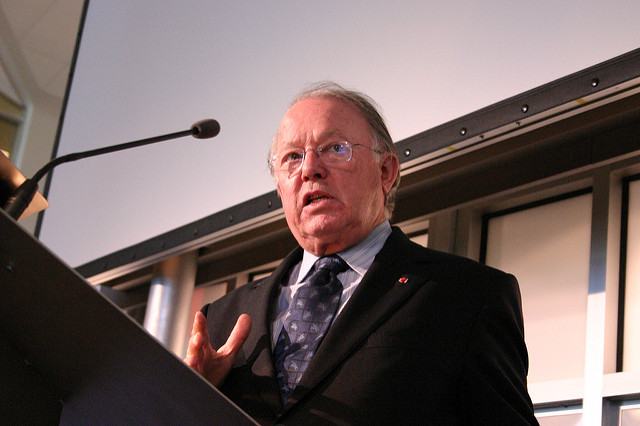
MONTREAL — Former Quebec premier Bernard Landry planned much of his own funeral service, held Tuesday inside Montreal’s Notre-Dame Basilica, and his choices ensured the ceremony would be as political as it was religious.
Friends, family and former colleagues remembered Landry as a loving family man, an economic visionary, but above all a leader devoted to making Quebec a country.
Shortly after provincial police officers carried Landry’s casket into the church, Premier Francois Legault paid tribute to a man he called a “great patriot.”
“He was a great servant of the state,” said Legault, who held portfolios in Landry’s Parti Quebecois government before he quit the sovereignty movement and eventually formed his own party, Coalition Avenir Quebec.
Landry was “a great servant of the Quebec nation — this nation, this people he loved with all his strength,” Legault added.
Next to speak was former premier Jean Charest, whose Liberals ended Landry’s time as Parti Quebecois premier in 2003.
Charest noted that politically, he and Landry “were, in the noblest sense of the word, adversaries.”
But the staunchly federalist Charest praised Landry for his uncommon commitment to the Quebec independence cause.
“I know nobody else for whom that conviction was so anchored in every aspect of his life,” he said. “He had set himself a mission, and in this battle he never took a single day off.”
Quebec’s 28th premier, who died last Tuesday at the age of 81, is recognized for helping Quebec’s tech sector flourish and for a landmark agreement with the province’s Cree, considered a model for relations between governments and First Nations.
Ted Moses, who was grand chief of the Grand Council of the Crees during the 2002 negotiations, remembered Landry as a “brother” and a friend of the Cree people.
“It was Landry who had the foresight and courage to put aside past differences,” Moses said.
Also chosen to speak at the service was Pierre Karl Peladeau, president and CEO of the media and telecommunications company Quebecor Inc. and a former PQ leader.
After greeting Landry’s family, Peladeau began his eulogy with the words, “a country,” repeating them many times during his address.
“A country. What could be more natural?” Peladeau asked.
“Our country,” Peladeau continued, addressing his words to the departed. “We will never forget it, like we will never forget you.”
As Peladeau concluded, a man stood up in the balcony and twice yelled: “Quebec for Quebecers!” triggering a smattering of applause. The man was escorted from his seat by security a few moments later.
Christian Lepine, the archbishop of Montreal, presided over the service with a roster of more than a dozen speakers, including former premier Lucien Bouchard.
Bouchard recalled Landry’s disappointment when the Yes side narrowly lost the 1995 sovereignty referendum in a campaign led by Bouchard and Jacques Parizeau.
“He believed, like others in October 1995, to have seen the promised land,” Bouchard said. “But if he regretted the people’s verdict, he never called it into question. Bitterness had no hold on his eternal optimism.”
Landry, a longtime Parti Quebecois minister, became party leader and premier in 2001 after Bouchard resigned.
His daughter, Pascale Landry, shared stories of her father’s family life, including a memory of him driving a Citroen and smoking Gitanes cigarettes. She said he treasured his grandchildren and was careful to instill in them a sense of their Quebec roots.
“More than any tribute, what would make him happy is that you all, in your way, continue his combat for a Quebec that is fairer, stronger, and more free,” she said.
Landry died at home in Vercheres, Que. of complications from pulmonary disease. His body lay in state Saturday in Quebec City at the provincial legislature and Monday in Montreal at the basilica.